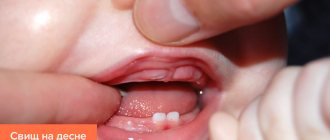Main reasons
Why is there constant constipation in one-year-old children or a six-month-old toddler? The main causes of constipation in babies include:
- poor nutrition, namely an abundance of fatty, sour, smoked and salty foods in the diet;
- low activity level of the baby;
- the presence of anal fissures, hemorrhoids, which cause pain during bowel movements;
- high workload of the child and exposure to stress;
- taking antihistamines, antidepressants, codeine, diuretics;
- presence of helminthic infestation;
- allergy to the abundance of protein foods in the diet;
- dysbacteriosis, which often alternates with constipation;
- heredity.
Causes of constipation in children
At the beginning of the development of this disease, the child may voluntarily hold stool if the stool is dense and difficult to pass or there are distractions (games, walks, interesting activities). The rectal ampulla is filled with fecal contents. Water is absorbed from it, the stool becomes dense, and excessive overstretching of the lower intestines reduces the urge to defecate and contributes to the occurrence of stool.
This condition is promoted by:
- poor nutrition. For infants - early introduction of complementary foods, a large proportion of solid foods and thick cereals, food based on whole cow's milk, refusal of breastfeeding. In older age groups - lack of fiber in the diet, reduced fluid intake;
- psychogenic factors. In children under 24 months, the pathology is often caused by improper formation of toilet skills, when parents force the child to potty train and every act of defecation is associated with stress. Stool retention may be accompanied by the beginning of visiting organized children's groups (kindergarten, school)4;
- reduction in the amount of beneficial intestinal microflora and proliferation of pathogenic ones. Normally, microorganisms are able to stimulate peristalsis due to the production of lactic acid;
- increased body temperature;
- inflammatory diseases of the rectum and anal fissure;
- hereditary diseases of the gastrointestinal tract (Hirschsprung's disease, dolichosigma);
- helminthiases.
How does constipation occur in a 1 year old child?
You can determine if a baby is constipated after one year by his behavior at the time of bowel movement. The normal process should not be accompanied by tension and pain. Constipation will be indicated by redness of the baby's face, grunting, nervousness and crying while going to the toilet.
Also, the main symptoms of constipation include:
- partial and difficult passage of stool;
- change in the structure of stool (may become softer or waterier, for example);
- absence of bowel movements for 2-3 days;
- lack of appetite;
- tearful mood;
- frequent urge to go to the toilet.
When a baby is constipated, hard and dry stool passes out, which causes pain. Because of this, the child begins to experience fear when going to the toilet. With dysbacteriosis, increased gas formation is added to the main symptoms. With constipation that lasts more than 3 days, the temperature may rise and general health may worsen.
No ads 1
Prevention
For prevention purposes it is necessary:
- form the habit of visiting the toilet at approximately the same time every day (best in the morning after breakfast);
- protect children from stressful situations and physical overload;
- establish proper nutrition, for which you can consult a nutritionist;
- provide the baby with regular and adequate physical activity, do not allow him to lead a sedentary lifestyle;
- refuse to self-medicate children for any disease, especially self-prescription of medications. For any health problems, consult your pediatrician.
Consequences
If the intestines are not emptied in a timely manner, this leads to detrimental effects on the gastrointestinal tract. Systematic constipation leads to a chronic form. Chronic constipation can cause a number of complications. Digestion of food may occur. In this case, the baby begins to suffer from anemia, weakness and decreased immunity.
Poisoning of the body, in which the breakdown products of feces begin to be absorbed into the circulatory system. At the same time, the child loses his appetite, his level of activity decreases and drowsiness appears. Stretching of the intestinal walls occurs, which often leads to inflammation of the mucous membrane, increased gas formation, pain and poor circulation.
Against the background of constant painful sensations, the baby begins to be afraid of the potty. This leads to the development of a neurological problem. With chronic delays in bowel movements, colon cancer may develop.
Constipation can lead to intoxication of the body
Description of the problem
So what is constipation? This is a functional intestinal disorder, characterized by slow movement of food contents, and manifests itself in the form of a long delay in bowel movements, partial emptying, and changes in the condition of the stool. Problems that arise regularly can negatively affect the baby’s health and negatively affect his growth and overall development.
Normally, children at the age of 3 cleanse their intestines once or twice a day. Due to a number of reasons, the rhythm may change slightly, and the time between physiological processes may increase significantly. Doctors speak of constipation when stool retention occurs for more than a specified time interval. Coprostasis in three-year-old children often causes local reactions: flatulence, intestinal pain, discomfort. They may show signs of general poisoning of the body: nausea, apathy, weakness, anxiety.
Diagnosis of pathology
If your baby often suffers from constipation, you should seek help from a pediatrician, who will often refer you to a proctologist and pediatric gastroenterologist. A visual examination is divided into an anamnesis, during which a specialist draws up the dynamics of the disease, records the frequency of bowel movements and the consistency of stool, as well as an examination, during which the doctor determines bloating.
[node:field_field_doprekl]
Palpation reveals feces and examines the level of sphincter strength. The specialist must also rule out developmental abnormalities. The medical specialist sends the baby for tests in the laboratory: biochemistry and general blood test, stool examination, ultrasound of the pancreas and stomach.
It is also necessary to undergo endoscopy and x-ray of the abdominal cavity, and examine parts of the colon.
Treatment
What to do if you are constipated? Constipation in babies may indicate the presence of various ailments that require immediate treatment. Recommendations regarding therapy should be made by a pediatrician who will select individual measures.
What to do for constipation at home?
When selecting a treatment option, the doctor should ask:
- severity of the disease;
- the reason for its appearance;
- the presence of pain;
- the age of the baby;
- psychological characteristics of the patient;
- associated ailments.
The treatment will be long-term, so you should not expect quick results.
Home help methods
In the case when a child is not able to empty himself, it is necessary to know the rules of first aid. The most effective first aid methods include cleansing enemas, glycerin suppositories, and laxatives (can only be given if prescribed by a doctor).
To help your baby with constipation, you can use an enema or glycerin suppositories.
For an enema, you should use boiled water at room temperature. Two teaspoons are added to the liquid. glycerin and solution are mixed. Under no circumstances should children be given an enema using saline solution, which will cause pain and a burning sensation. Children tolerate this procedure with whims.
[node:field_field_doprekl2]
When using an enema, you must adhere to safety rules that will help not harm the child:
- We disinfect the syringe.
- Lubricate the tip of the syringe with baby cream.
- Fill the syringe with boiled water at room temperature.
- Using an enema, we administer about 200–220 ml of liquid to the baby.
Important! It is contraindicated to exceed the recommended dose of administered fluid, so as not to cause pain in a small child.
When is urgent help needed?
A child who is only one year old requires urgent help from a medical specialist in cases where, due to constipation:
- the stool looks too dense interspersed with mucus and bloody streaks;
- the child experiences severe pain in the abdominal area;
- blood is discharged from the anus;
- temperature rises;
- the baby is vomiting;
- against the background of constipation, liquid stool leaks out.
Relieving a small patient of such pathologies can only be done by a doctor.
Therapeutic diet
What can a one-year-old child eat if he has problems with bowel movements? In order to forget about constipation, you should follow a special diet, feed often, but little by little. The therapeutic diet requires the complete exclusion from the menu of rice porridge, whole milk, baked goods, pasta, unpeeled apples, pears and bananas, legumes, cabbage and mushrooms, chocolate, cocoa and jelly.
It is better to discuss your diet with your local pediatrician.
Compliance with the recommendations is especially important for those children who are prone to pathology. Therapeutic nutrition should consist of fruits, cereals, vegetables, bran, whole grain bread, buckwheat porridge, and millet. It is recommended to include corn, wheat porridge, soups and borscht, lean meat, butter, and chicken eggs in the menu.
It is very important to provide your baby with enough water throughout the day. For drinking, it is better to choose bottled or filtered. You can also give drinking yoghurt, yogurt, and kefir. For constipation, it is best not to self-medicate, but to seek help from a pediatrician with your children, who will prescribe appropriate treatment and help get rid of the disease.
Diet
To normalize stool at 3 years old, sometimes it is sufficient to change the nature of his diet and increase the drinking regime. In general, it is necessary to form eating habits from early childhood, when the first complementary foods are introduced. After all, it often happens that a child who periodically eats tasty, but not very healthy dishes, resists switching to food necessary to normalize the functioning of the gastrointestinal tract. Therefore, nutrition should be effective and as balanced as possible.
Nutrition rules
To eliminate problems with bowel movements in three-year-olds, it is a good idea to follow simple rules:
- Follow the feeding schedule. Eating food at the same time contributes to the correct and coordinated functioning of the intestines.
- Have dinner no later than two hours before bedtime. This will relieve the digestive system, which will promote proper rest and sound sleep.
- Drink half a glass of clean water on an empty stomach. This will allow the intestines to wake up and start working.
- Exercise. Daily exercise stimulates the functioning of the intestines and other body systems.
- Don't overeat. The main condition for a tendency to constipation. Meals should be frequent and small.
Products approved for consumption
The daily diet of three-year-old children should contain food rich in fiber, beneficial bacteria, vitamins and microelements. Nutritionists include the following in the list of permitted foods:
Berries and fruits - raspberries, currants, apricots, plums, apples, bananas, kiwi.- Vegetables - carrots, beets, pumpkin, cabbage (white, cauliflower, broccoli), bell peppers, cucumbers, tomatoes, potatoes.
- Fermented milk products - fermented baked milk, yogurt, kefir, curds, natural yoghurts.
- Cereals - wheat, buckwheat, oats in the form of whole grains or flakes, brown rice.
- Greens – lettuce, parsley, dill, spinach, sorrel.
- Dried fruits - figs, dates, prunes, dried apricots, raisins, honey (if there are no allergies).
- Bran and wholemeal or rye bread.
- Lean fish, meat, poultry.
Parents should try to steam, bake, stew, and boil dishes. At any time of the year, salads made from fresh produce, seasoned with cottage cheese, yogurt or vegetable (preferably olive) oil, have a good effect.
What can't you eat?
Rich broths, fried or smoked foods, pickles, marinades, sweets, and fast food should be excluded from the list of products. It is recommended to limit the use of:
- white wheat bread;
- pasta;
- dishes made from semolina, white rice, dough;
- legumes;
- milk, cheese;
- pears and blueberries;
- strong tea, coffee, cocoa, chocolate, jelly.
The task of parents is to limit the consumption of foods that slow down the process of bowel movements as much as possible. As you grow older, you can deviate from the rules, but strict adherence to the diet should become the norm. For chronic constipation, a child may be prescribed diet No. 3. Its main principle is frequent (4-6 meals) and fractional (small portions) meals. In general, it involves the use of the above set of products.











